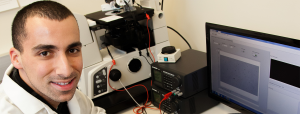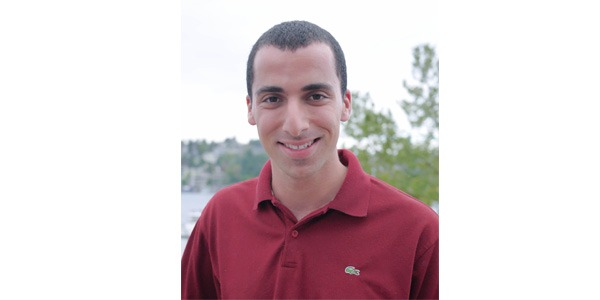Bioengineering senior Hani Mahmoud is eager to help establish collaborations between the United States and Kuwait on mutual interests in biomedicine to improve health.
America and Kuwait may be tied by oil, but senior Hani Mahmoud hopes to help forge a new bond based in research. Hani, who graduates June 14 with a degree in bioengineering, was recently awarded a prestigious Fulbright Student Study/Research grant. He will spend the next academic year in Kuwait, collaborating with the Dasman Diabetes Institute on research and outreach aimed at improving children’s health.
At first, Kuwait might seem an unusual destination for a young bioengineering graduate. But alarmingly high rates of diabetes and obesity there – some of the highest in the world – have created a health crisis and in response, a burgeoning biomedical community. “I knew I wanted to work in the Gulf area because I wanted to work on my Arabic, and the really intriguing thing to me is that the Gulf area is investing so much money in the biomedical sector,” Hani says.
The number of Kuwaitis with type 2 diabetes is approaching 25 percent of the population, according to the International Diabetes Federation. And without intervention, diabetes rates in the Middle East are projected to soar – increasing 96 percent by 2035. Evidence suggests the post-Gulf War economy fueled a shift in lifestyle and health. A number of factors, including greater overall wealth and a culture of eating out, a sweltering desert climate that limits outdoor activities and perhaps genetics, have combined to create health challenges.
Hani notes that the health problems there are also present in the United States. With grant funding taking a hit in the U.S., he saw an opportunity. “The
Right now most of the researchers there are local or regional, and there are not too many Americans who have thought to work in Kuwait, Hani says. “As an Arab-American, I’m more familiar with the culture and the religion in that area. Working in Kuwait provides me with a unique opportunity to do some global networking within the biomedical sector, and to see what type of relationships we can start to form through my working there and bringing those ties back here.”
Improving health, advancing knowledge within community
Hani, who grew up in Issaquah, Wash., and travels to Egypt yearly with family, is eager to make connections with Kuwaiti researchers, teachers, parents and children in order to both change kids’ lifestyles to improve health and to advance knowledge about exactly how exercise bestows a health benefit.
Many studies show that exercising is healthy, but scientists are still working out exactly what happens on the molecular level that improves health. Through collaboration with his Fulbright research adviser, Dr. Ali Tiss, a scientist at the Dasman Diabetes Institute (DDI) in Kuwait City, Hani will work to help answer the basic science question of what goes on at the molecular level during exercise. How does exercise influence a cascade of molecular events that results in a health benefit? He will also lead a hands-on educational outreach program aimed at improving kids’ health habits.
Though the specifics may change upon his arrival in Kuwait, Hani’s proposed project features interaction with the community on many levels. With the aid of the DDI and its connections, he plans to recruit 50 kids (25 obese and 25 lean) ages 8-15 from local schools for his study. He hopes to introduce an interactive video-game based exercise component to bring about a change in lifestyle. He plans to interview parents about each child’s health and exercise habits, and to interview the kids about their outlook on health, exercise and how video games or different activities could play a role in these areas. Before and after his six-month study, Hani’s DDI collaborators will collect blood samples that he will help analyze for molecular markers. He hopes to report his research results on molecular mechanisms governing diabetes and exercise, as well as interview insights into how to inspire effective lifestyle changes among Kuwaiti youth, at both U.S. and Kuwaiti forums and the 2015 World Diabetes Congress.
Research, outreach experiences at UW prepare Hani for Fulbright

“Hani’s biggest strength as an engineer is his enthusiastic and productive interpersonal communication,” says Chris Neils, senior lecturer and Hani’s capstone project adviser. “He defies the stereotype of the introverted engineer, being an eager contributor in class, a generous donor of his time in the peer mentoring program, and a strong communicator reaching out during his capstone work, all while doing strong technical work. His peer mentoring sessions are well organized and, although they focus on the course planning needs of the freshmen and sophomores that visit him, he ties in the capstone work he and others have done as illustrative examples of the options available to them.”
In Associate Professor Wendy Thomas’s lab, he studied the molecular basis for bleeding disorders, learning to think on a molecular level and examined how individual proteins respond to different forces, with a therapeutic solution as the end goal. He gained interdisciplinary experience through internships at Philips Healthcare and Fred Hutchinson Cancer Research Center. He studied abroad in the Netherlands and volunteered with One World Environment/Engineers Without Borders to design a solar-powered water pump system to provide clean water to schools and orphanages in Haiti.
“UW Bioengineering highly values research,” Hani says. “It’s one of the few departments in which every single student has to do at least a year of lab-based research in order to graduate. Just being a part of that, getting involved in the world of research and understanding the logistics of how scientific progress is made was really helpful in being able to communicate with researchers abroad.”
Through outreach and working with incoming and current freshmen, he discovered that he really enjoys educational and interpersonal interactions. He has gained teaching experience through service as a peer adviser in UW Bioengineering, a peer educator for the UW Honors 100 course, a mentor for UW’s Dream Project and a tutor both for student-athletes and for the UW’s Early Engineering Institute, to name a few.
Impacting lives through medicine, research
“UW Bioengineering has opened a lot of doors for me,” Hani says. “They really prepare you well for a career in medicine, research or industry.”
Hani plans to pursue an MD and/or a PhD after he returns from Kuwait. After shadowing a surgeon at Virginia Mason and getting into the operating room, he knows he enjoys the opportunity to positively affect patients’ lives in a tangible way. He also sees research as the avenue to make a global impact. “I enjoy the interpersonal aspect of medicine and education but think research will always be some part of my career. That’s how you advance knowledge and overall human well-being.”
“The biggest thing I’m hoping to get out of this experience is an opportunity to network with the growing biomedical sector that in Kuwait,” Hani says. “The connections I’m going to build there I hope to foster and keep for years to come.”



